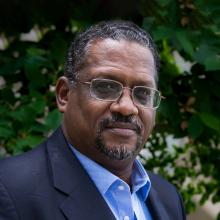Member Spotlight: Michael Cunningham
Professor and Associate Provost for Graduate Studies and Research at Tulane University, Department of Psychology, Africana Studies Program; SRCD Publications Co-chair; Frances D. Horowitz Millennium Scholars Program Director.
What interested you in becoming a developmental scientist?
My interest in developmental science began as an undergraduate student. I started college with a major in Computer Science and a minor in Mathematics. As a first generation college student my goal was to get a degree and a decent job. My life changed when I got bored with writing computer language programs and I took an elective course in education. The course required me to do what is not called Service Learning in a local elementary school. I was placed in a 4th grade classroom and fell in love with teaching. I continued volunteering at the school after the semester ended and I changed my major to Child Development with a concentration in Elementary Education. I wanted to change the world by being a 4th grade teacher. In doing so, I stayed in college a 5th year to take the additional teacher certification courses, which included more psychology and child development coursework. That extra year of college exposed me to psychology research, which was laden with deficit theorizing and research about African American children and families, especially Black boys. Thus, my graduate school research was associated dispelling the myths of success in Black children and adolescents as well as adding more information the typical developmental process that was lacking in research on Black populations. My early worked focused on research questions associated with why some Black adolescent males present with anger and discontent with the educational systems. I learned that the hypermasculine attitudes and behaviors were associated with exposure to traumatic experiences. If unchecked, the hypermasculine attitudes and behaviors translated to disrespect of authority figures in schools, which lead to academic challenges. However, these hypermasculine attitudes and behaviors were learned, so they could also be unlearned with young people having opportunities to experiment in spaces that supported their growth and development as well as understood the circumstances from which they live and grew up. This early work developed into understanding how contextual experiences intersect with personal experiences of cognitive-, identity-, and gender development to influence successful and challenges outcomes. My research tends to have a basic formula of understanding how context, self, and outcomes are related with diverse populations and situations.
Do you have a mentor or mentors who have been instrumental to your career and, if so, whom and how?
My mentor is Dr. Margaret Beale Spencer. I started working with her my last semester at Morehouse College when she was a professor at Emory University in the same city. My work with Dr. Spencer encouraged me to apply to graduate school at Emory where I earned a M.A. and Ph.D. under her mentorship. As her professional career changed to her becoming the Board of Overseers Professor at the University of Pennsylvania, I followed her there and completed a 2 year postdoc under her. I credit Dr. Spencer for being an influential person in my life. She is a great mentor (still today!) and exemplar model of a developmental scientist. I learned how to mentor students based on how I was mentored by her. Also, seeing how her phenomenological variant of ecological systems theory (PVEST) developed from her early research on the balance between affect and cognition in developmental science to continued research on how individuals make meaning of their experiences has influenced the research questions I address and how my program of research has developed over time.
What words of wisdom might you pass on to someone on their very first day after deciding to get a Ph.D. in developmental science or related?
I would offer words of perseverance and continued focus on developmental science. Graduate school can feel isolating sometimes, but the peer and professional relationships we develop as grad students are the foundation of our continued work. I would also advise a new early career colleague to have a plan of completion early on in the PhD journey. Link coursework requirements to areas in which interest you. Develop thoughtful research questions that are based on strong theoretical perspectives. Use the latest methods to understand how developmental science is operationalized with an asset-focused perspective.
Who inspires you?
I am inspired by the next generation of scholars. One of the advantages of working on a college campus is that I get exposed to new smart people each year. I get inspired when I see intellectual curiosity grow into a well-designed research study. When I teach graduate student seminars, I get inspired of reading the latest publications produced by my long term colleagues and linking the new publications to classic readings. I get inspired when early career colleagues meet professional and person milestones, which gives me confidence that good research, especially on minoritized populations, is still being produced and will continue to being produced.
What does the Black Caucus mean to you?
SRCD’s Black Caucus is my family. No matter what other professional affiliations I have, the Black Caucus is a core part of who I am. My first professional presentation was at a Black Caucus pre-conference in Seattle, Washington in 1991. I grew up professionally in the Black Caucus, as it was my entryway into SRCD. The colleagues I developed in the Black Caucus have become lifelong friendships along with trusted colleagues. I am honored to see how my colleagues have continued to grow and develop into leaders of SRCD and developmental science more broadly.
